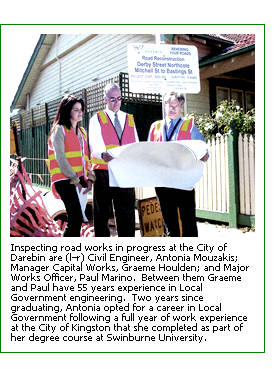A shortage of engineers in Australia is threatening growth in Local Government infrastructure, according to industry bodies and recruitment companies. In response, the Institute of Public Works Engineering Australia (IPWEA) has released a strategy and action plan to address the issue.
The shortage is starting to delay projects and increase costs with salary rises of up to 20 per cent in some parts of the Local Government engineering sector. While the present situation is looking difficult, it is estimated that increasing retirement of baby boomers will result in losses approaching 50 per cent of people working in the field. At the same time in 2004, some 1,700 first year university engineering places were not filled.
Students are tending to choose other courses, like information technology, law, medicine, vet and marketing, which are seen as being careers more lucrative than engineering.
With the rapid deterioration of Australia’s postwar infrastructure, this shortage is compounding problems for Local Governments needing to undertake urgent works.
IPWEA National Executive Officer, Ross Moody, said the strategy aims to attract young people back into the industry and Local Government. The strategy looks at the root causes of the problem which include:
- Deprofessionalism and increased use of technicians to fill in what was previously the role of the professional engineer.
- Outsourcing of traditional public works programs and a focus on the bottom line.
- A lowering of community awareness of the roles and responsibilities of public works professionals.
- Reduced student intake because of careers of excitement in other areas.
The IPWEA strategy operates on a strategic industry level and a local level. One of the key actions is to work with the Australian Local Government Association (ALGA) and the Local Government Managers Association to develop a strategy aimed at attracting young people to a career in Local Government.
Ross Moody said the public sector had not kept up with training and development of new staff. “The focus on the bottom line has been at the expense of cadetships, vacation employment and work experience,” he said. “This may have produced short term gain but at the expense of long term pain.”
“Engineering, let alone public works engineering, is not evident to the public. The profession does not generally come to people’s notice until something goes wrong – then it causes public inconvenience. So when the profession does become evident it is seen in a negative light – this makes it difficult to sell public works engineering as an attractive industry to work in.”
The strategy and action plan seeks an alliance with other bodies such as Engineers Australia, the Association of Professional Engineers Scientists and Managers Australia and the Association of Consulting Engineers Australia to press home the case for more to be done to encourage young people to become engineers.
Ross Moody said an important part of the IPWEA strategy is to involve young people. “We are holding a forum in Sydney on 26 May and will be inviting young engineers from each State division of IPWEA to review our strategy before we push ahead,” he said. Recruitment firms are now being compelled to go interstate and overseas to supply Local Governments with engineers.
The Queensland branch of the recruitment firm TAD General Manager, Peter Stapels, said that recruitment agencies across the State had a high level of both permanent and contract work in Local Government on their books.
“It is not unusual for TAD to recruit from Sydney and Western Australia, and as far afield as South Africa and England,” he said.
President of the ALGA, Councillor Paul Bell, believes that the shortage of engineers is a serious problem for Local Government. Recent research suggests that only three per cent of graduate engineers are considering a role in Government as a whole. The figure for interest in Local Government may be as low as one per cent of graduates.
Councillor Bell applauded the work of State Local Government Associations in their efforts to link in with graduates at university and in career guidance programs at schools. “Private enterprise already does this well and we have to work to build up these links,” he said.

















